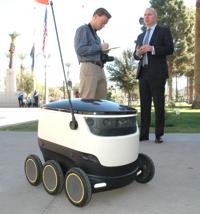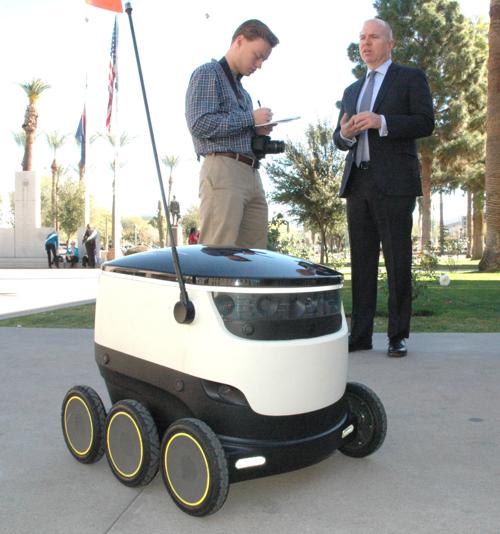PHOENIX — The killing of a pedestrian crossing the street by an autonomous vehicle this week has a Mesa lawmaker giving second thoughts to allowing automated motorized delivery devices on sidewalks.
House Majority Whip Kelly Townsend told Capitol Media Services her bill to allow autonomous vehicles onto sidewalks to make deliveries likely needs a closer look after the fatal crash and may need more restrictions.
Her concerns come after an incident Sunday night in which a vehicle being tested by Uber, operating in autonomous mode, struck and killed 49-year-old Elaine Herzberg, who was crossing a street outside of a crosswalk in Tempe. Preliminary reports are that the vehicle did not brake before hitting her, suggesting it did not “see” her.
In the interim, Uber has suspended all of its self-driving testing in Arizona and elsewhere.
But Townsend’s House Bill 2422, pushed by Estonia-based Starship Technologies, already cleared the House and now awaits Senate action.
A Starship Technologies spokesman said last month the plan is to have the automated devices deliver groceries and packages. He said the devices are programmed to unlock when they reach their desired destination.
Townsend, who saw them in operation in Washington, D.C., liked the idea.
The proposal is to give these devices the same rights and duties as pedestrians, with whom they will share the sidewalks and crosswalks. That includes a mandate to follow all traffic and pedestrian-control signals.
“Once it’s on the sidewalk, it has to obey the laws and it can’t be mowing people down, obviously,” Townsend said. “I want them to have to abide by our laws so that they’re not just running amok.”
At the same time, Townsend said the idea is to allow the testing without a lot of up-front regulation. She said that is in line with the philosophy espoused by Gov. Doug Ducey, who first opened the door to autonomous vehicles on Arizona roads in 2015 with an executive order.
But Townsend said she can’t ignore what happened Sunday.
“I don’t want my name attached to a fatality or injury,” she said of her legislation. “So I want to make sure what we’re doing going forward is safe.”
Some of the safeguards built into her original proposal, which passed the House on a 52-7 vote, were removed when the measure went to the Senate Transportation Committee last month.
Gone, for example, is a 100-pound weight limit.
Townsend said she agreed to that change because there are companies other than Starship Technologies that have their own devices that weigh more. She said the state should not be crafting laws that favor one device or company over another.
Still, she acknowledged, a heavier vehicle can cause a lot more injury if it runs into a pedestrian. And given what happened Sunday, Townsend said she may insist that the weight limit be put back into the bill.
The version awaiting a Senate roll-call vote also removes some other provisions from the original bill, including a requirement that the devices have brakes, and that they be barred from transporting hazardous materials.
Also gone is a requirement for $100,000 worth of liability insurance.
Townsend said that, given all the questions, it might be appropriate to put a “sunset” provision into her legislation, having it self-destruct at some future date unless specifically renewed by lawmakers. That would require the Legislature to determine whether changes are needed in the law, or even whether Arizona wants to continue to allow the devices on sidewalks.





